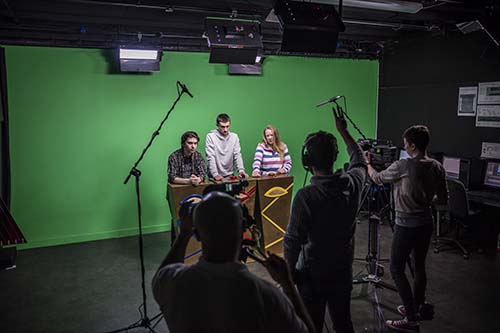TV and Digital Film Production – QQI Level 5

Course Details
- Dun Laoghaire Further Education Institute
- South Dublin City
- Art, Design and Media, Film and Video
- € 50.00
- Further Education and PLC, Level 5 QQI
- Start Date: 15/09/2025
Course Description
Duration
This is a Full time one-year course, which runs from September to May. Exact details of the timetable will be given out to students during the induction process prior to class commencement in September.
Overview
This course is an excellent foundation for Film and Television degrees in; IADT (National Film School), DCU,, TU Dublin, and other Higher Education Institutes and Universities. Students will acquire practical skills in both Film and Television Production, including single-camera production, non-linear film, and video editing. Through the study of Media Analysis, students gain knowledge of how the relationship between the producer, the advertiser, and the audience impacts one another. These skills will be evidenced in a portfolio of work including Film, Scriptwriting, and Photography. This portfolio of work may be used for progression applications to degree programmes elsewhere.
Entry Requirements:
One of the following:
- Leaving Certificate (LC Established, LCVP, LCA) or equivalent
- A Full Level 4 QQI Award (or equivalent)
- For Mature applicants (aged 21 or over) – appropriate experience will be considered in lieu of formal qualifications. Note: Mature applicants may be entitled to VTOS funding. For details about VTOS, please contact the college.
- Applicants whose first language is not English require level B2 competency on the CEFR language framework. Applicants may be required to undergo English language testing to establish their language competency.
Course Modules:
- Television and Film Editing
- Film Production
- Traditional Black and White Photography
- Media Analysis
- Digital Movie Processing
- Scriptwriting
- Communications
- Work Experience
Certification:
Level 5 QQI Award Film and Television Production (5M18519)
Special Features:
This is a very practical course where the student will develop a personal portfolio of work; structured and produced to television and video industry standards. Students will use professional digital cameras, and practice editing techniques using Avid Media Composer (software) as well as darkroom practice and techniques.
This course is supported by FIT, which offers students the opportunity to acquire essential skills to gain employment. Students are given training in job interview techniques and CV preparation.
Free Full Suit of Adobe Creative Cloud Software for all students on this course for one year to facilitate portfolio and assessment work.
All DFEi students are provided with an M365 account, which gives them access to the tools and resources needed to deliver assessment work while attending their course. M365 Apps include Word, PowerPoint, Excel, Outlook, and OneDrive.
Work Experience:
Students will be required to undertake a period of work placement in an organisation connected to their vocational area during the academic year. Work Experience is mandatory for all of our full-time Level 5 courses. Students are required to source their own work placement but will be assisted in this by the work experience teacher. The work placement is usually for a period of 10 days or a minimum of 60 hours. Students usually find the work experience element of the course to be invaluable and should bear in mind that a successful work placement can sometimes lead to further opportunities.
Additional Information:
Students will produce a portfolio of materials from their coursework in Film, Scriptwriting, and Photography, which may be used for applications to IADT and other Higher Education Institutes and Universities.
Assessment:
Assessment techniques will be used to assess the knowledge and skills that students will have achieved on successful completion of modules:
- Student Record
- Portfolio/Collection of Work
- Assignments
- Examination – Written or Practical
- Project
- Skills Demonstration
All assignments are submitted electronically. Therefore all students need access to a device such as a computer/laptop.
A full major award is granted for passing the relevant eight components. On successful completion of each component, you will be awarded a pass, a merit or a distinction grade. See www.qqi.ie for more details
Progression Opportunities:
DFEi: Graduates may progress to the Level 6 QQI Advanced Certificate in Television and Digital Film at DFEi.
Elsewhere: Graduates are eligible to apply through the CAO and/or the Higher Education Links Scheme for entry to year one of a range of higher certificate and degree programmes, at Universities, Institutes of Technology, and Technological Universities using their full QQI Level 5 major award. Places are not guaranteed in these Institutes and are subject to students meeting certain criteria. It is the student’s responsibility to consult with the relevant HEI for information on the admissions process and any specific entry requirements. Students may also refer to the individual HEI prospectus or may also refer to the QQI FET section of the CAO website. www.cao.ie
Examples of CAO progression opportunities are listed below.
Progression Examples:
BA Film (DL843)
BA Photography and Visual Media (DL833)
BA New Media Studies (DL837)
BA Television (DL844)
IADT, Dún Laoghaire (National Film School) – www.iadt.ie
BA Film and Broadcasting (TU983)
BA Photography (Portfolio) (TU976)
Technological University Dublin (City) – www.tud.ie
BA in Film and Television Production (DK864)
BA Creative Media (DK863, DK769)
Dundalk Institute of Technology – www.dkit.ie
BA Communication Studies (DC131)
Dublin City University – www.dcu.ie
BA Film and Screen Media (CK105)
BA Arts (CK101)
University College Cork – www.ucc.ie
BA Media Studies (MH109)
BA Arts (MH101)
Maynooth University – www.nuimaynooth.ie
BA Media Production and Digital Arts (TU982)
Technological University Dublin (Tallaght) – www.tud.ie
BA Creative Digital Media (TU706, TU981)
Technological Institute Dublin (Blanchardstown) – www.tud.ie
TV and Media Production (CW547, CW578)
Institute of Technology Carlow – www.itcarlow.ie
Career Paths:
Graduates usually opt to advance to further studies, while others have gained direct employment as production managers, production coordinators, directors, and assistant directors.



